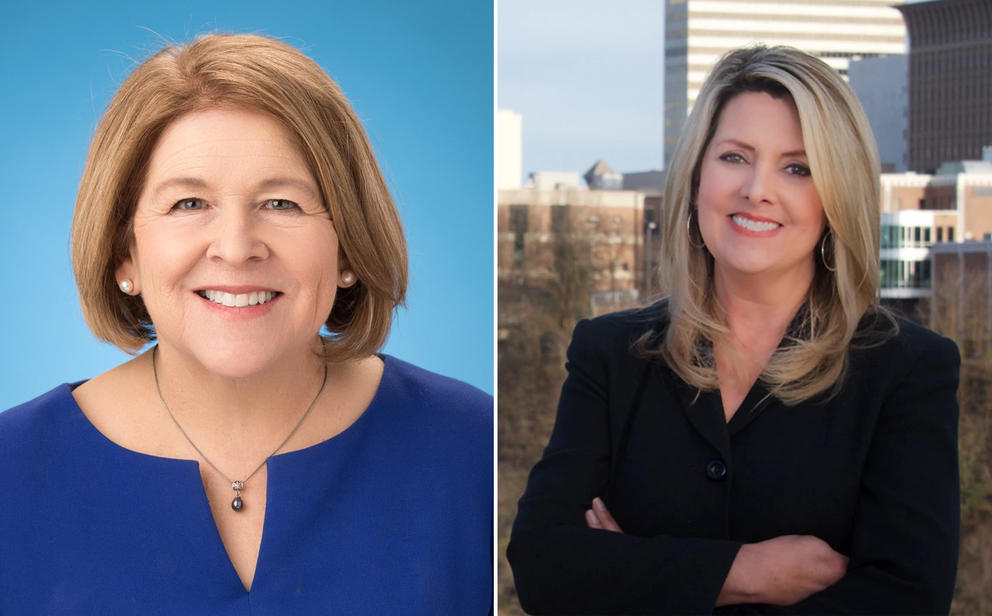“At one point, I was thinking the last question would be, ‘Say something nice about your opponent,’” said Gary Stokes, general manager of local PBS station KSPS, to incumbent Nadine Woodward and opponent Lisa Brown during the Sept. 28 debate. “I think that ship has sailed.”
Both candidates – and the audience – laughed before Woodward said, “Lisa loves dogs, and so do I, so there you go.”
The mayoral candidates – two women, for the first time in Spokane since 1985 – have a few more commonalities. Both settled in Spokane and raised their families after their careers – Brown as an economics professor and Woodward as a broadcast journalist – brought them to the city. Decades of living in Spokane led to love for the region that has fueled their interest in running for public office.
Both have waged well-funded and contentious campaigns to persuade voters their opponent is unfit to lead the city through some of its most challenging issues, including homelessness and public safety.
For Woodward, Brown represents the worst levels of state government intrusion, something she says she has been fighting since she entered the mayor’s office nearly four years ago. A vote for Brown, she contends, means bringing in the “radical left policy” she adopted during decades as a state legislator. And while running the state Department of Commerce, Brown was at odds with Woodward on Camp Hope, where hundreds of the unhoused lived on state property in Spokane’s East Central neighborhood.
“We’re gritty over here. We don’t look for handouts. We don’t want big government to get in the way,” Woodward said. “We want Spokane solutions to our challenges, not radical left policy coming from the West Coast.”
At the same time, Woodward has had to contend with accusations of associating with one extreme right-wing figure. In August she stood on stage at a prayer rally with Matt Shea, a former state legislator and accused domestic terrorist. Woodward maintains she did not know Shea would be at the event and denounced his politics.
Brown has pushed the narrative that her long career in public service has provided institutional knowledge and experience that will be crucial in addressing challenging issues, including homelessness and crime, that she argues Woodward has failed to address adequately.
Brown believes Woodward’s adverse relationship and unwillingness to cooperate with others, including legislators in Olympia, has kept Spokane from the funds and resources needed to solve the city’s issues. In contrast, she highlights the dollars she’s brought in for the city’s successful ventures, such as the establishment of a health sciences district that houses Washington State University’s medical school, which she had a hand in as chancellor of WSU’s Spokane campus.
“As Commerce director, I worked from Spokane, including during the pandemic,” Brown said. “I just saw so many missed opportunities and lack of collaboration and partnership that would move the city ahead. That tipped me over in deciding to run.”
Breaking down the numbers
Campaign finance reports show strong interest in this race: Collectively, the two candidates have garnered more than $900,000 in cash and in-kind contributions as of last week, with Woodward raising the most with $491,756.03 – 66% more than she raised in 2019. Brown had contributions totaling $442,780.14 so far. Both amounts have surpassed the previous contributions record of $395,023.59 from former mayor David Condon's reelection bid in 2015.
Brown has had 20 years of electoral success in Spokane, a blue city in otherwise conservative Eastern Washington. Even in her failed 2018 bid for Congress against current Republican Rep. Cathy McMorris Rogers, Brown won handily in Spokane.
“In 2018, I had over 50,000 votes [from] the City of Spokane, I won in the city pretty significantly,” she said. “I’m not taking that for granted, but it’s a good base to start from.”
Meanwhile, Woodward is counting on Spokane’s moderate voters rejecting what she calls Brown’s “extreme left” policies to help her earn a second term in office.
That’s not just hypothetical. Woodward says she’s been approached by Democrats who plan to vote for her.
Brown won the primary with 48% of the vote, compared to 37% for Woodward. Nearly 13% of voters backed conservative mayoral candidate Tim Archer – votes Woodward is expecting to pick up in the general election, even though Archer has not endorsed anyone.
Voters are picking a mayor for a city that has changed considerably, even just in the past several years, said Kevin Pirch, political science professor at Eastern Washington University. Spokane was an attractive destination for those working remotely during the pandemic because it was considerably more affordable than cities like Seattle and Portland.
But the influx of residents – and a lack of available housing – has driven prices up. Spokane is now dealing with many of the same issues Western Washington urban areas are facing, namely homelessness, crime and drug use, Pirch said.
Woodward has to counter the narrative “that things are faring poorly” in Spokane by playing a comparison game. “The smart play [is to say], ‘You might not like things the way they are now, but my opponent will make it so much worse,'” he said.
Top issue: homelessness
Homelessness in Spokane was a central issue when Woodward ran for mayor for the first time in 2019, and, not surprisingly, it remains the top issue for voters four years later.
For voters, the issue remains sizable and visible. The 2023 one-night Point in Time count earlier this year found 2,390 unhoused residents, a 36% increase from 1,757 counted in 2022.
Homelessness was most visible in Spokane for about 18 months when Camp Hope housed as many as 600 residents within a city block in Spokane’s East Central neighborhood. The encampment started at Spokane City Hall as a protest over a lack of shelter beds but relocated to property owned by the state Department of Transportation. State agencies opted to let the encampment remain while using state funds to provide services to residents and help them relocate to other housing.
Woodward’s administration and state agencies – including Commerce, which Brown was running – were at constant odds during Camp Hope’s tenure. Those conflicts led to lawsuits from the city and county to force the cleanup of the camp and relocation of its residents. The lawsuits were dropped or didn't progress and the encampment ultimately closed in June of this year.
Woodward maintains the state – including Brown’s Commerce agency – enabled the camp to remain open longer despite unnerving residents of the surrounding low-income neighborhood.
Woodward has voiced concern over another part of Brown’s platform around this issue: Brown has talked about utilizing safe parking, in which an area, such as a church parking lot, would be open to those whose only option is to sleep in a car or RV. In many campaign materials – including on a separate website – Woodward claims Brown would be enabling smaller versions of Camp Hope by opening safe parking lots around the city.
On her website, Brown said Woodward is mischaracterizing her statements on homelessness solutions. Brown believes the parking-lot debate distracts from her valid criticisms of Woodward’s policies, including establishing the Trent Resource and Assistance Center, which opened in August.
Woodward considers the shelter, which accepts about 300 people, a success, noting that the center provides not only a bed but additional services. Brown calls the shelter Woodward’s biggest mistake and a money pit. She notes that the first operator, Guardians Foundation, had to be removed due to accusations of embezzlement. Brown questions the property owner, a known Woodward supporter, for having the city take financial responsibility for installing bathrooms and indoor plumbing.
Ultimately, Brown argues, there still aren’t sufficient beds to address the city’s unhoused population after the closure of another city-owned shelter.
Woodward has leaned into the creation of a regional homelessness authority, and went to Houston to learn about best practices for forming such a regional organization. In late June, a trio of community leaders tasked with establishing the authority’s structure shared a plan they believed could reduce homelessness by 40% within two years if action was taken quickly.
The aim was to establish the Spokane Regional Authority for Homelessness, Housing, Health and Safety at the start of 2024. However, the Spokane City Council put an indefinite break on moving the authority forward, voicing concerns that there would not be sufficient representation of service providers or those who have experienced homelessness.
Woodward said she’s prepared to have additional conversations and address Council members’ concerns, but worries that the delay will halt Spokane’s recent momentum.
“We knew that as we were creating this regional homeless authority [that] it was like building the plane as you’re flying it,” she said. “That’s how they did it in Houston. You cannot wait for it to be completely baked before you move forward.”
Brown said she supports a homeless authority, particularly if it fosters collaboration and combines funds from different communities. However, she believes that the region still needs a navigation, outreach and assessment system, perhaps integrated with the regional authority.
Affordable housing
Increasing affordable housing has been tied to the challenges of reducing homelessness.
Woodward notes that she and the progressive-leaning City Council have worked together to revise zoning policies to allow the building of a variety of housing units, including duplexes and triplexes, on single-family zoned property. The Journal of Business reported a year-over-year increase in multifamily housing permits in the city as of May of this year.
“We did it before the state, and it got national attention,” she said. “We worked with the Council, and they passed that unanimously.”
Brown emphasizes using available state and federal dollars, including the Housing Trust Fund at Commerce – money she believes Woodward and the city missed out on. She believes Woodward should have worked with nonprofit housing providers to secure grants and get more housing built.
Brown also noted a rotating roster of housing directors who left during Woodward’s tenure, including one who wrote an extensive letter criticizing the mayor, which was highlighted in a number of local news reports.
“I feel we’re paying a cost, an opportunity cost of the inexperience and lack of collaboration of this administration,” Brown said.
She plans on having staff who would report to her on federal and state money that the city can use to incentivize and remove barriers for developers.
Brown acknowledges, however, that the city was ahead of the curve in adopting zoning policies that would help bring additional housing, but said more needs to be done. “It’s not enough in itself, I think various kinds of incentives or financial products [are needed].”
If she’s reelected, Woodward plans to leverage about $10 million to $15 million collected through a new one-tenth of 1% sales tax to create a larger housing development fund for affordable housing. She also is looking into a federal tax credit to incentivize housing development.
Public safety
Woodward points to drug decriminalization as an example of her work fighting state policies that she believes have been harmful to the city.
She said law enforcement resources had been disproportionately used to address overdoses and crimes related to drug use. That prompted Woodward to work with the Council on a local ordinance to ban drugs from public places and to work with other mayors from across the state to push for new statewide drug possession laws.
Woodward expects to keep fighting the state Legislature to prevent policies that she says disempower police to do their jobs – in particular, removing the qualified immunity that has shielded police officers from civil lawsuits.
“If you take [qualified immunity] away, why would anyone want to be a police officer?” Woodward asked. “They’re already risking their lives. Why would they want to sign up for a job that doesn’t protect them?”
In her public safety plan, Brown has voiced concern about a slow police response rate and an increase in robbery, burglary, property crime and domestic violence in different neighborhoods around Spokane.
She said her priority will be to address staffing issues at the Spokane Police Department, which she believes have contributed to the problem. She is also interested in expanding a behavioral health unit developed at the county level, in which mental health professionals and law enforcement officers work together to respond to mental health emergencies.
She also believes a lot of police resources have been used to address homelessness-related issues, and says that’s another reason for improving the way the city responds to homelessness.
Balance of power
Woodward wants to continue to provide a conservative counterbalance to a primarily progressive City Council. While Spokane has a strong mayor, Woodward said the Council’s progressive supermajority has made it difficult for her to fully act with her executive powers.
That progressive majority could be strengthened if Brown is elected and progressive candidates prevail for Council President and other open Council seats.
Woodward said she’s prepared, as she did during her first term, to work with a progressive majority in the Spokane City Council, but adds that “I’m looking for more balance so we can have robust debate about the policies we’re creating, policies we’re passing as a city, and that’s not happening. This Council, with their supermajority, are passing things by emergency ordinance, which means they are blocking public engagement.”
Brown, not surprisingly, gives a far more benign take on her coordination with like-minded candidates. She notes that she’s done some campaign activities with other candidates to increase outreach to voters. “It creates more energy and enthusiasm for everybody,” she said.
Brown said she’s also been at events where she has found potential future opportunities to work with others on policies, such as an early childhood initiative to increase kindergarten preparedness. Brown, Council member and Council President candidate Betsy Wilkerson and Council candidate Paul Dillon also issued a joint statement urging a pause on residential development in the Latah Valley until there is sufficient fire responder coverage. The region, while within city limits, is more rural, which increases the wildfire risk.
Matt Shea impact
It remains to be seen whether Woodward’s reelection bid will be negatively impacted by appearing on stage with former state legislator and accused domestic terrorist Shea at a prayer event in August. That led to the Spokane City Council condemning Woodward for her participation.
Pirch, the EWU professor, said Woodward needs to connect and energize more conservative voters, such as those who supported Archer in the primary. But she also has to be careful not to alienate the moderate voters who helped her get elected four years ago.
“She’s got to convince those Archer voters that ‘In your mind, it’s so much worse for Lisa Brown to be mayor than me,’” he said.
Woodward maintains her focus was praying for the hundreds of people impacted by wildfires in Medical Lake, a Spokane suburb.
“I didn’t support his ideology,” she said. “I didn’t ask for his endorsement.”
Woodward has also argued that Brown is aligned with problematic people. One campaign statement accused Brown of associating with people with felony records, linking to stories from an activist website.
Brown said she’s focused on reaching out to voters and getting her message out and less on the claims Woodward is making about her. “I just have to try to cut through it.”
Woodward also said she’s gained support from those who support freedom of religious expression.
“We had record numbers of people show up at City Council to support me on the night the Council decided to denounce me,” she said. ‘It upset a lot of people. My office has been inundated with emails and phone calls from people saying, “I don’t know what this Council is doing. I don’t know what they’re thinking. I don’t know what these activists are trying to say. But we support you.’”




